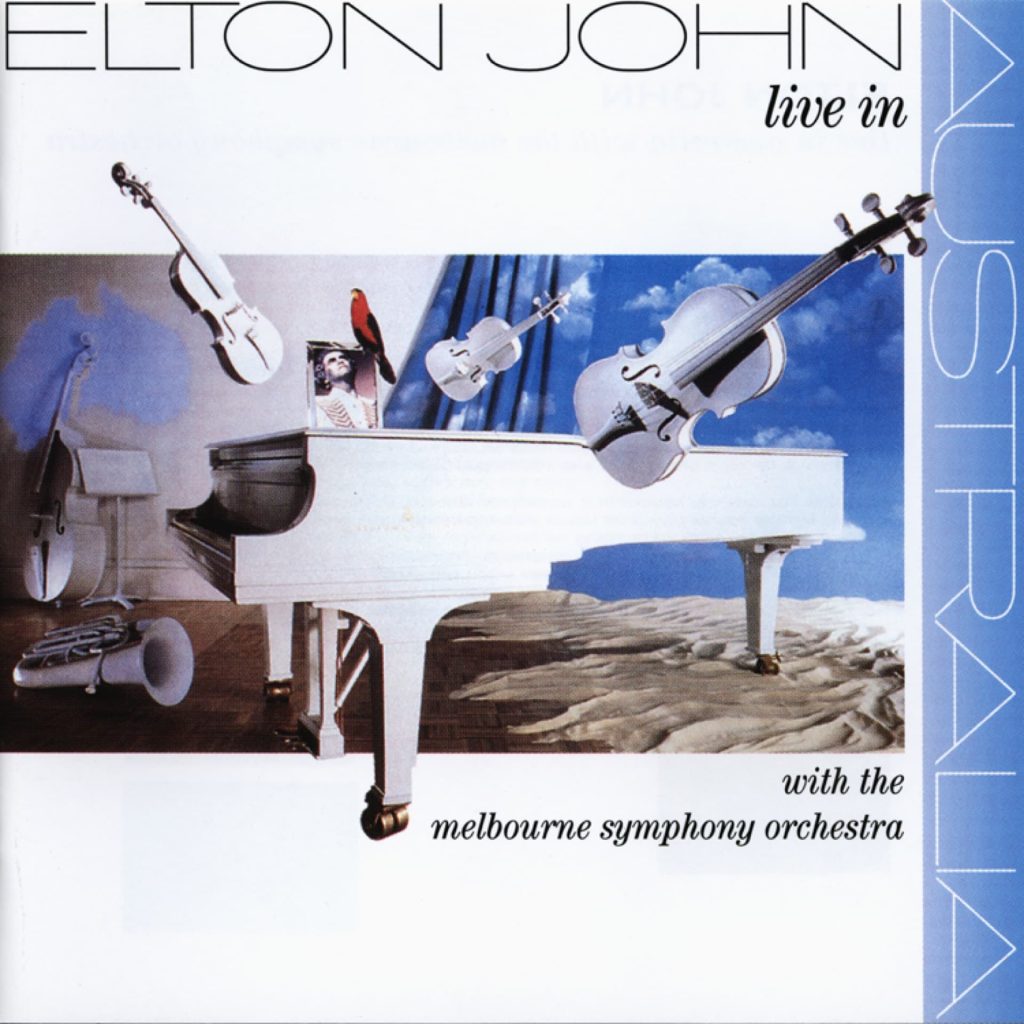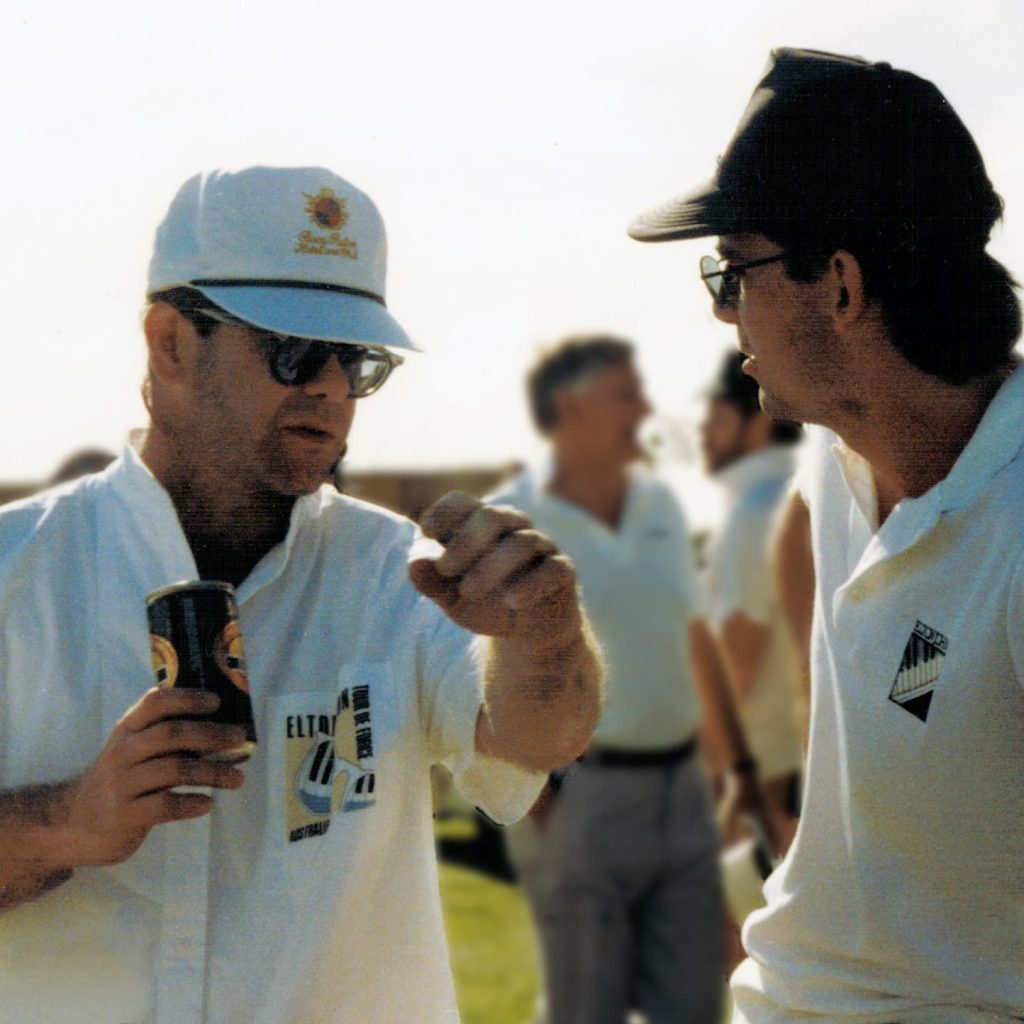Menu
Elton’s ‘Tour de Force’ Remembered – Part 2

From November 5 to December 14, 1986, Elton played 26 dates in Australia with his 14-piece band and the 88-piece Melbourne Symphony Orchestra (MSO).
In this second and final part of our tribute to the “Tour de Force”, which resulted in the 1987 album Elton John Live in Australia with the Melbourne Symphony Orchestra, we speak with the MSO’s then-Concert Master, violinist Rob John.
EltonJohn.com: When you think of the tour with Elton 30 years ago, what comes to mind?
Rob John: It was such an extraordinary event really: a six-week commitment dragging an extra hundred people round the countryside. In those days it was a fairly crazy type of notion. Other tours that are done here with other artists, it’s a couple of shows here and one show there, type of thing.
EJ.com: Do you know if the MSO was the first choice?
RJ: I think that originally the Sydney Symphony were going to do it, but for one reason or another they couldn’t. I think they had scheduling that they just couldn’t move. But it was early enough for us to do. Which was a good thing too.
EJ.com: How did you first hear about it?
RJ: We were out at one of the Universities here in Melbourne when we were doing a concert. We were in the rehearsal break when [Elton’s then-Tour Manager] Nick Pitts came down to say hello. This would have been four or five months before the rehearsals began. He came in from LA and he had the miniature of the set that they were going to use, all in scale and everything. And he took us through it and he answered our questions and said, “We’re really looking forward to this thing. It’s going to be really exciting, and we can’t wait to see you guys later in the year”, and I think that was basically it.
EJ.com: And what did you think?
RJ: I think most of us were actually really bloody excited from the start! Because of the opportunity to do something so different. I mean we’d mainly been a concert orchestra up to that point, and to do something where somebody brings in a model of the stage set-up and explains to you how this is basically going to work… And it was going to be, you know, a major, major event because of the number of concerts that we were going to be doing. I’m pretty sure that at this period of time that it broke the record. Certainly, I think it did in Sydney, ‘cause we did twelve shows in Sydney, at the Entertainment Centre.
EJ.com: It has been documented that there was a member of the orchestra that perhaps was not embracing this opportunity as much as you did?
RJ: Yeah. The principal clarinet player. He was given the opportunity to not do the tour (anyone could opt out if they wanted) but he chose to stay. I’m not sure why.
EJ.com: But he, pardon the pun, changed his tune towards the end?
RJ: Oh, dramatically. I mean, when you sit on stage for that amount of time and working with those guys, and realising the level of musicianship and the care that is taken. I think he had to take note.
EJ.com: Were you a fan of Elton John’s music?
RJ: I had Goodbye Yellow Brick Road. A lot of the material, actually I did know. I grew up in the UK in 1969, around about the time that Elton’s career was really starting to kick in. So I knew all of the songs that came out in those days.
In those days not everyone had the money to buy an album, so somebody would get it and you’d go to their house…and you might put this thing on rotation for half the night! So that’s where I remember the Yellow Brick Road album coming out, because a friend of mine bought it and we just played this thing relentlessly. As young orchestral musicians, we were gobsmacked because of the use of orchestral arrangements that he was doing. On Blue Moves as well.
EJ.com: Were you impressed with the orchestration charts that James Newton Howard put together?
RJ: Oh yeah, it was great. During that time I learned the name of Paul Buckmaster, who of course did a lot of stuff with Elton back in the ‘70s. It’s fabulous writing. Madman Across The Water, the string writing on that track was great. And then, of course, James extrapolated some of the stuff that was originally by Paul to a much larger orchestra and did a great job. Beautiful stuff.
And he was really open to suggestions. I think I was cheeky enough, at one stage, on Don’t Let the Sun Go Down On Me… Because it was going to be this huge peak of the concert, I said, “James, would you have any objection if we do a run and we scream up an extra octave higher at the end of this thing?” and he said, “Let’s try it and if it’s good, let’s put it in!”
I also suggested to Nick Pitts this crazy idea for the final show. When the whole audience lights their cigarette lighters during Candle In The Wind. I said to him, “What would be the chances of the orchestra doing that on the second verse, pre-empting the audience?” So he said, “We’ll look into it”. Well, the following day, this big box arrived, and he said, “This is your responsibility now!” So I look in the box and I think there were 95 butane lighters! [laughing] I explained to the orchestra beforehand, “I’ll light-up first. Once you see me light, everybody go for it!” It was fun; the audience went nuts. Poor Elton, he had no idea this was going to happen. So he’s looking at the audience, wondering what the hell’s going on, why are they suddenly going nuts, and then he turns around and sees us!
EJ.com: So the orchestra was, in essence, a part of the audience during that song.
RJ: Well, that was the fantastic thing, to be honest. We had our laminated passes which would allow us into the hall, and a lot of the band would go every night and stand at the back, by the doors, and watch the first half of the show, before going to play the second half. So we got a free show every night!
EJ.com: I suspect opening night was perhaps a bit different than even the rehearsals.
RJ: It was vastly different! When the scrim went up and the lighting came up on the orchestra, I think it was one of the biggest rushes the orchestra had ever had. To have however many thousand people just suddenly screaming and shouting…it was quite amazing.
EJ.com: When was the last time you put the album on for a listen?
RJ: I’ve listened to it a number of times over the past 30 years. For me, the extraordinary thing is, you hear all of the stuff that you need to hear. It was a supreme mix. For Gus to be able to do that with that many tracks (72), without all the technology that we have these days…it’s extraordinary. There are a few things that happen in there but…it’s a live gig, y’know? And it wasn’t edited relentlessly like it would have been these days. It wasn’t comp’d up out of a million takes. I think in some of the songs it actually worked better than the studio recordings from years before. When you hear that rawness [in his voice]. He sang every show, every song, with such passion. And certainly as the tour developed the voice was struggling. But it’s that rawness and that passion that sort of makes something happen. There are a few songs certainly on that album which I think benefitted, if you like to use that term, from the situation his voice was in. I mean, they really were from the heart and from the gut.
I remember speaking to him about the throat operation prior to him going to do it. He said that he’d had a meeting with the specialist/surgeon and he didn’t know what was going to come out of it. I mean, quite seriously, he didn’t know at that point was he actually going to be able to even sing properly again? Or what the changes would be, even if they were minimal. Incredibly scary.
But his playing… his ability to go off on a tangent with his piano solos, which were staggeringly beautiful sometimes and heart-wrenching and pounding and exciting in other ways. Plus the theatrics of being able to play like this, upside down on the piano with your hand…

Elton with Rob John in Perth, 1986.
EJ.com: Did the orchestra socialise with Elton and the band off stage?
RJ: Yes, some of the things that we did were spectacular. We had a cricket match in Perth! Elton said to me, “I’d like to have a cricket match: my guys against your guys.” I said, “Yeah…um…what’s happening?” He said, “You get your team together and I’ll get my team together, and we’ll bus everybody out to the Swan Brewery, we’ll have a barbeque out there and we’ll have a cricket match!”
And he said, “I want to put a couple of professional players on each of the teams, so you’ve got two guys from the Western Australian cricket team, Bruce Laird and Wayne Clark, and I’ve got a couple of guys on mine.” So I said, “Oh, so who’ve you got?” and he said, “Oh, it’s just Laurel and Hardy, don’t worry about it.” So we turned up at the cricket ground and Elton came round the corner with a big cheesy grin on his face and said, “I’d like to introduce you to my two guys. This is Rod Marsh and this is Dennis Lillee.” Now Rod Marsh was the wicket keeper for the Australian cricket team at that stage and Dennis Lillee was the fastest fast-paced bowler in the world! So I can say that I was bowled by Dennis Lillee and caught by Rod Marsh.
EJ.com: Where in your professional life do you place the experience that was the “Tour de Force”?
RJ: It was a huge turning point. Elton set up two scholarships with the MSO, one for an instrumentalist from the Orchestra and also a piano scholarship. The idea was for them to develop their talents and skills. I was the first of that bunch of people. He gave me the opportunity to study the violin, at a very later stage of my career. And that kicked the door open to me changing the type of work that I did – I was a session player in London, I toured to Japan a number of times with an orchestra there, I was guest-leading orchestras back here in Melbourne – and then after that doing things in a little studio of my own. I did a crossover album in the mid-90s and managed somehow to do a 22 or 23 documentary scores and a number of Australian feature films.
Elton is an extraordinary person, apart from being a musician. A lot of people, including me, don’t know half of what he does, but I know the generosity that he’s shown to people over a long period of time. And I know there are many people that have done things that are very different with their lives and music because of those opportunities that Elton gave. And I am privileged to count myself among them.
